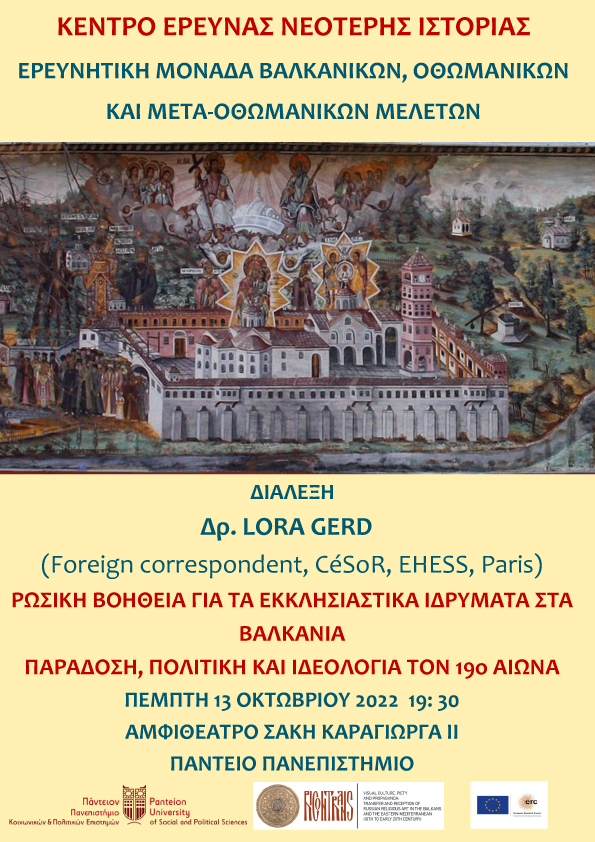Lecture by Dr. Lora Gerd: “Russian support for the church institutions of Greece: tradition, ideology and politics in the 19th century”
Panteion University (KENI-Research Centre for Modern History) October 13, 2022, 7:30 PM

Lecture by Dr. Lora Gerd, Foreign correspondent of the CéSoR (Centre d’ études en sciences sociales et religieux) at EHESS, Paris, with the topic of “Russian support for the church institutions of Greece: tradition, ideology and politics in the 19th century”
October 13, 2022, 7:30 PM
Panteion University (KENI-Research Centre for Modern History),
Saki Karagiorga II amphiteatre
On Thursday, 13 October, 2022, 7:30 PM, at Panteion University (KENI-Research Centre for Modern History), Saki Karageorga II amphiteatre, Dr. Lora Gerd gave a lecture on “Russian support for the church institutions of Greece: tradition, ideology and politics in the 19th century”
ABSTRACT:
In the churches and monasteries of the Balkans one can find vessels, garments, icons and decor brought from Russia during the 19th century. What is the history of these donations? Were they made occasionally or according to a certain plan? The archival documents help us to answer these questions.
The Russian support for the Orthodox Greek population of the Ottoman Empire started already in the 16th century, and steadily increased during the 17th century. Beginning with the 1830s, the contacts between Russia and the Greek world were related to the so called Eastern question. Continuing its support to the Orthodox Patriarchates of the East, the Russian government aimed at strengthening its influence among the Orthodox population. In the 1850s a new period of ecclesiastical and cultural relations with the church of Greece started: both the Russian and the Greek Synods were interested in matters of canon law and liturgical practices, attitude to non-Orthodox Christians, etc. The ideas of the church politicians of that period were about creating a big “Orthodox home”, where different nations could learn the traditions, carry out educational projects and reform their church life.
Thanks to the activities of the priest of the Russian mission in Athens, Archimandrite Antonin Kapustin, the restοration of St. Trinity church was finished in 1855. Another small church in Athens, Agia Zone, was also restored by Antonin.
In the 1860s and 1890s along with donations to the Slavonic monasteries and churches of the Balkans, the Greek Orthodox institutions also enjoyed support from Russia. Special attention was paid to the region of Trebizond and the Theological school in Halki island, and to those which suffered from wars or earthquakes.
CV:
Dr. Lora Gerd graduated from St. Petersburg State University (Classics, 1992). Her PhD was on “Questions of Canon Law in the Tacticon of Nikon of Black Mount (XI-th Century)”. The title of her Dr. hab. Thesis was “Constantinople and Petersburg: Russian ecclesiastical policy in the Orthodox East (1878-1898)” (2006). She is a specialist in Russian policy in the Ottoman Empire and Greek-Russian relations in the 19th and early 20th century (Russian church policy in the Near East and the Balkans, history of Byzantine studies, confessional and cultural relations). She has participated in the projects: “Open Jerusalem”; “The church of England and its relations to the Orthodox East”; director of the project “Russia and Mount Athos in the 19th and 20th centuries”. A regular participant in international conferences and invited lecturer at EHESS (Paris), Cyprus University (Nicosia), Lund University (Sweden), Dr. Lora Gerd is foreign correspondent of the CéSoR (Centre d’ études en sciences sociales et religieux) at EHESS, Paris. During the last years she has been working on projects concerning the Russian policy in the Patriarchates of Alexandria and Antioch (19th and 20th centuries). Dr. Lora Gerd was a member of the research team of RICONTRANS project [Visual Culture, Piety and Propaganda. Transfer and Reception of Russian Religious Art in the Balkans and the Eastern Mediterranean (16th to early 20th century)] and her lecture is part of the project’s activities.
RICONTRANS has received funding from the European Research Council (ERC) under the European Union’s Horizon 2020 research and innovation programme (grant agreement No. 818791).
The lecture was in Greek.